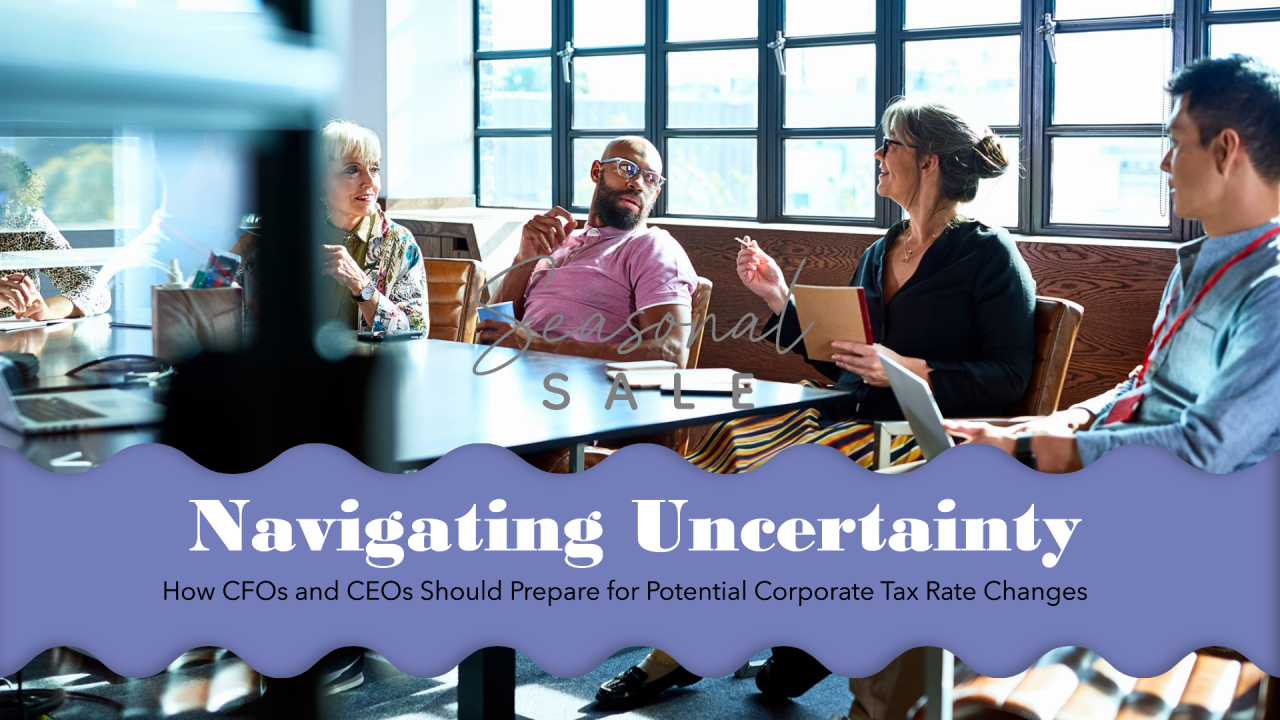
Navigating Uncertainty: How CFOs and CEOs Should Prepare for Potential Corporate Tax Rate Changes
Florida CFO Group
A partnership of Chief Financial Officers (CFO) providing fractional (part-time) and interim CFO services.
As the November election looms, CFOs and CEOs are grappling with a significant unknown: the potential change in the corporate tax rate. The current 21% levy, a remnant of the 2017 tax reform, could either increase or decrease depending on the election outcome. With Vice President Kamala Harris advocating for a hike to 28% and former President Donald Trump proposing a reduction to 20% or even 15%, the stakes are high. Finance leaders are in a difficult position, trying to model their financial strategies around these potential shifts, with many settling on a cautious 25% rate in their forecasts.
The impact of any tax rate adjustment cannot be understated. A higher corporate tax rate would reduce after-tax returns on investments, directly affecting cash flow and investment strategies. As John Gimigliano of KPMG points out, every dollar paid in taxes is a dollar less that could be used to fuel growth or fund critical projects. For companies like Vera Bradley, where taxes already constitute a significant portion of available cash for investments, a higher rate could slow down expansion plans and curtail growth initiatives.
Conversely, a lower tax rate could free up capital, allowing companies to reinvest in their operations, explore new markets, or enhance their competitive positioning. Favorable tax conditions might even encourage businesses to keep their operations domestic rather than seeking international avenues to reduce tax exposure.
So, how should CFOs and CEOs prepare for this potential tax rate shift?
1. Scenario Planning and Modeling
Finance teams should proactively engage in scenario planning, modeling different tax rates to understand their potential impact on cash flow, investment strategies, and overall financial health. As Conagra Brands CFO Dave Marberger notes, running three- and five-year forecasts with varying tax rates can provide valuable insights into how these changes could influence capital allocation and growth plans.
2. Assess Investment Priorities
Given the uncertainty, it’s essential to evaluate and prioritize investment opportunities. Companies with strong balance sheets, like Chipotle Mexican Grill, may choose to maintain their strategic investments regardless of tax changes. However, businesses with tighter margins may need to reassess their capital expenditures, focusing on projects that offer the highest return on investment even in a higher tax environment.
3. Reevaluate Pricing Strategies
For companies facing a potential tax increase, passing on some of the costs to consumers might become a consideration. CFOs like Anthony Gruber of Mama’s Creations are already contemplating how to offset a higher tax bill, with price adjustments being one option. It's crucial to carefully evaluate the elasticity of demand for your products and consider how price changes might affect customer behavior.
4. Strengthen Balance Sheets
In times of uncertainty, a robust balance sheet can be a significant asset. Companies should consider strengthening their financial position by managing debt levels, improving liquidity, and optimizing working capital. This approach provides more flexibility to navigate whatever changes may come, whether it’s absorbing higher taxes or capitalizing on opportunities that arise from a lower tax rate.
领英推荐
5. Stay Agile and Informed
Lastly, agility is key. Political and economic landscapes can shift rapidly, and finance leaders must be ready to adapt. Staying informed about potential policy changes and maintaining open communication with tax advisors will be critical in making timely, informed decisions.
Conclusion
While it’s impossible to predict the exact outcome of the November election and subsequent tax policy shifts, CFOs and CEOs can take proactive steps to prepare. By modeling different scenarios, reassessing investment priorities, and strengthening their financial positions, businesses can position themselves to weather potential tax changes and continue driving growth. The key is to remain flexible and ready to pivot as the situation evolves.
Authors
Anna Agnew, MBA, CTP is a Partner at the Florida CFO Group and a Certified Treasury Professional, boasting over 15 years of experience providing CFO Services across 29+ industries. With a rich background in finance, treasury, and accounting, Anna brings a wealth of real-world, hands-on corporate financial leadership experience to the table. Her collaborative, results-oriented approach has driven success in both corporate and consulting roles for public and privately held companies of varying sizes, from start-ups to multi-billion-dollar enterprises. You can also visit?Anna’s LinkedIn Profile for more information. You can email Anna directly here.
Don Noble, a Partner at the Florida CFO Group and the owner and founder of Accelebron, has an extensive background in financial leadership and advisory roles. Leveraging his wealth of experience, he collaborates with businesses to optimize their financial and technological strategies, fostering growth and resilience in a dynamic marketplace. Don is also a doctoral student studying CFO leadership. You can also visit Don’s LinkedIn Profile for more information.
Authors
How a Corporate Tax Rate Change Could Impact Companies’ Growth, Investment, by Jennifer Williams , Aug. 26, 2024, The Wall Street Journal